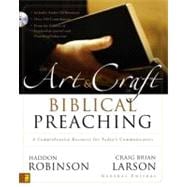
What is included with this book?
| How to Use This Book | p. 15 |
| Contributors | p. 17 |
| Acknowledgments | p. 20 |
| The High Call of Preaching How can I be faithful to what God intends preaching to be and do? | |
| Convictions of Biblical Preaching | p. 23 |
| A Definition of Biblical Preaching | p. 24 |
| A Weekly Dose of Compressed Dignity | p. 29 |
| Overfed, Underchallenged | p. 31 |
| Theology of Powerful Preaching | p. 33 |
| Preaching That Raises Our Sights | p. 36 |
| Leading and Feeding | p. 37 |
| John 3:16 in the Key of C | p. 41 |
| Growing in Your Preaching | p. 44 |
| Spiritual Formation through Preaching | p. 48 |
| Preaching Life into the Church | p. 53 |
| My Theory of Homiletics | p. 58 |
| Staying on the Line | p. 59 |
| History of Preaching | p. 64 |
| The Spiritual Life of the Preacher How should I attend to my soul so that I am spiritually prepared to preach? | |
| A Cup Running Over | p. 71 |
| The Patented Preacher | p. 74 |
| I Prayed for My Preaching | p. 79 |
| How Does Unction Function? | p. 81 |
| Squeaky Clean | p. 85 |
| Required Reading | p. 89 |
| Rightly Dividing the Preaching Load | p. 90 |
| Preaching through Personal Pain | p. 95 |
| A Prophet among You | p. 99 |
| Burning Clean Fuel | p. 103 |
| Backdraft Preaching | p. 105 |
| Why I Pace Before I Preach | p. 108 |
| Preaching to Convulse the Demons | p. 109 |
| Holy Expectation | p. 112 |
| Considering Hearers How should my approach change depending on who is listening? | |
| Preaching to Everyone in Particular | p. 115 |
| The Power of Simplicity | p. 121 |
| View from the Pew | p. 124 |
| Preaching to Ordinary People | p. 126 |
| Why Serious Preachers Use Humor | p. 130 |
| Connect Hearers through Dialogue | p. 141 |
| Self-Disclosure That Glorifies Christ | p. 143 |
| How to Be Heard | p. 145 |
| Opening the Closed American Mind | p. 149 |
| Turning an Audience into the Church | p. 154 |
| Preaching to Change the Heart | p. 159 |
| Preaching Truth, Justice, and the American Way | p. 163 |
| Preaching Morality in an Amoral Age | p. 166 |
| Cross-Cultural Preaching | p. 171 |
| Connecting with Postmoderns | p. 174 |
| Preaching amid Pluralism | p. 177 |
| Connecting with Non-Christians | p. 179 |
| How to Translate Male Sermons to Women | p. 181 |
| He Said, She Heard | p. 184 |
| Connecting with Men | p. 188 |
| Creating a Singles-Friendly Sermon | p. 191 |
| Preaching to Preschoolers | p. 193 |
| Hispanic-American Preaching | p. 195 |
| Table of Contents provided by Publisher. All Rights Reserved. |
The New copy of this book will include any supplemental materials advertised. Please check the title of the book to determine if it should include any access cards, study guides, lab manuals, CDs, etc.
The Used, Rental and eBook copies of this book are not guaranteed to include any supplemental materials. Typically, only the book itself is included. This is true even if the title states it includes any access cards, study guides, lab manuals, CDs, etc.
Excerpted from Art and Craft of Biblical Preaching: A Comprehensive Resource for Today's Communicators by Haddon W. Robinson, Zondervan Publishing Staff
All rights reserved by the original copyright owners. Excerpts are provided for display purposes only and may not be reproduced, reprinted or distributed without the written permission of the publisher.